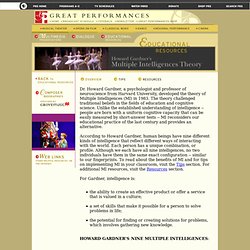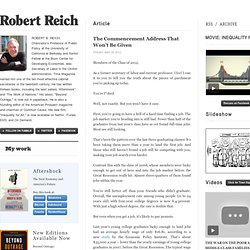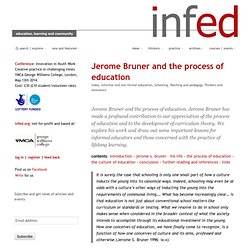

The Engaging School A handbook for... Sugata Mitra: The child-driven education. Great Performances . Educational Resources . Howard Gardner's Multiple Intelligences Theory . Overview. Dr.

Howard Gardner, a psychologist and professor of neuroscience from Harvard University, developed the theory of Multiple Intelligences (MI) in 1983. The theory challenged traditional beliefs in the fields of education and cognitive science. Unlike the established understanding of intelligence -- people are born with a uniform cognitive capacity that can be easily measured by short-answer tests -- MI reconsiders our educational practice of the last century and provides an alternative. According to Howard Gardner, human beings have nine different kinds of intelligence that reflect different ways of interacting with the world. Each person has a unique combination, or profile. For Gardner, intelligence is: the ability to create an effective product or offer a service that is valued in a culture; a set of skills that make it possible for a person to solve problems in life; the potential for finding or creating solutions for problems, which involves gathering new knowledge.
Multiple Intelligences Thrive in Smartville. Ken Robinson - multiple intelligences. The Commencement Address That Won't Be Given) Members of the Class of 2012, As a former secretary of labor and current professor, I feel I owe it to you to tell you the truth about the pieces of parchment you’re picking up today.

You’re f*cked. Well, not exactly. But you won’t have it easy. First, you’re going to have a hell of a hard time finding a job. That’s been the pattern over the last three graduating classes: It’s been taking them more than a year to land the first job. Contrast this with the class of 2008, whose members were lucky enough to get out of here and into the job market before the Great Recession really hit. You’re still better off than your friends who didn’t graduate. But even when you get a job, it’s likely to pay peanuts. Last year’s young college graduates lucky enough to land jobs had an average hourly wage of only $16.81, according to a new study by the Economic Policy Institute.
Presumably this means that when we come out of the gravitational pull of the recession your wages will improve. Don’t get me wrong. The ROI on That Sheepskin. Colleges are a bit like funeral homes.

Talking about getting your money’s worth strikes some as a little crass. But overcharging people is crass, too. College demands an increasingly big chunk of change, and the returns aren’t necessarily there. Writing recently in The Wall Street Journal, Jack Hough lined up a number of experts to dispute a claim by President Obama that college is a great investment. Hough pointed out that “tuition and fees have increased 184% in 20 years after accounting for inflation, but wages for college grads have risen just 9%, according to Labor Department data.” “Mr. Peter Drucker thought about education all his life. “The educator usually distrusts economic discussion of education,” Drucker noted. But Drucker countered that this was not an excuse to stop thinking in terms of return on investment.
What do think: Has a college education ceased to provide a reasonable return on investment? Jerome bruner and the process of education. Contents: introduction · jerome s. bruner – his life · the process of education · the culture of education · conclusion · further reading and references · links It is surely the case that schooling is only one small part of how a culture inducts the young into its canonical ways.

Indeed, schooling may even be at odds with a culture’s other ways of inducting the young into the requirements of communal living…. What has become increasingly clear… is that education is not just about conventional school matters like curriculum or standards or testing. What we resolve to do in school only makes sense when considered in the broader context of what the society intends to accomplish through its educational investment in the young. How one conceives of education, we have finally come to recognize, is a function of how one conceives of culture and its aims, professed and otherwise.